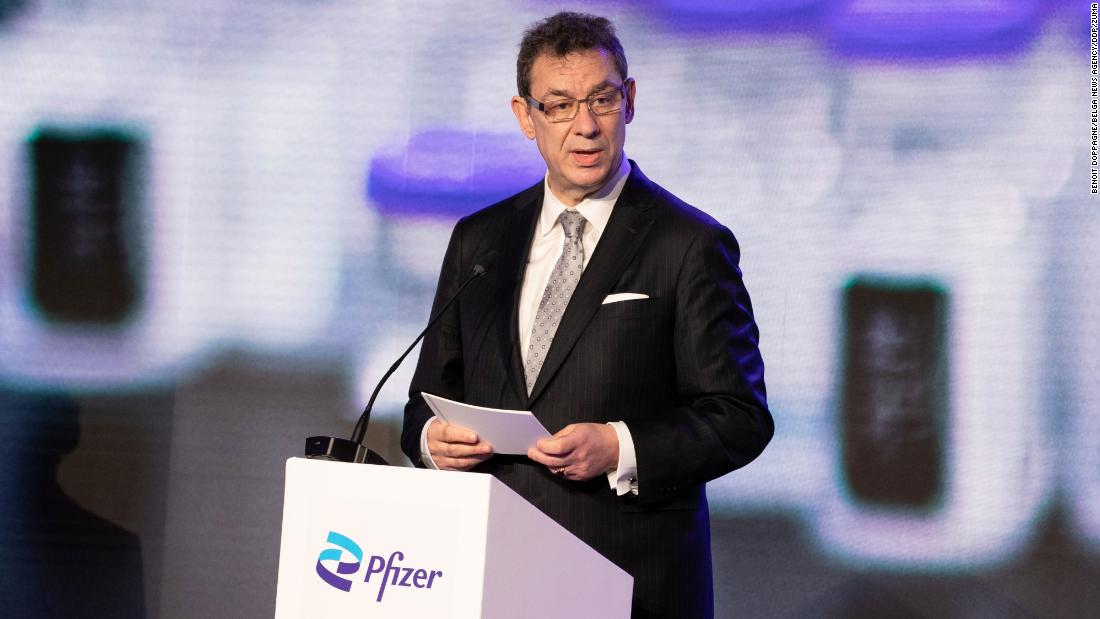In a matter of days, Pfizer CEO says they’ll be ready to ask for approval of a Covid-19 vaccine for kids
“It is a question of days, not weeks,” Pfizer Chairman and CEO Albert Bourla told ABC News Sunday about when the company will submit data on children ages 5 to 11 to the FDA for consideration.
Currently, Covid-19 vaccines are only approved for children 12 and older, which has stirred concern among health experts as cases in children increase, school years begin and the more transmissible Delta variant spreads.
Once the data from Pfizer/BioNTech is in, it will have to go through two committees, one for the US Food and Drug Administration (FDA) and one for the CDC, CNN Medical Analyst Dr. Johnathan Reiner said Sunday. If the data comes in this week, it would likely be in committee by the end of October, he added.
And there is a lot of data for them to look at, he said.
“This is a vaccine for children, so getting the dose right — in terms of efficacy and side effects — is crucial,” Reiner said.
But even when a vaccine becomes available, a difficult task lies ahead in getting children vaccinated. Less than half of US adolescents are fully vaccinated against Covid-19, according to a CNN analysis of CDC data.
In response, officials need to do a better job educating the public about the importance of vaccination for the health of their children and their families as a whole, Reiner said.
“If you want kids in school, the best way to keep them in school is to keep them from getting Covid,” he said.
“We know how to keep them safe,” CDC Director Dr. Rochelle Walensky told CBS Sunday. “When we don’t use the proper mitigation, they’re more likely to have outbreaks.”
Former FDA Commissioner Dr. Scott Gottlieb said he encourages parents to vaccinate their children when they can.
“This is a dangerous pathogen,” Gottlieb told CNN. “I wouldn’t be so cavalier about this virus, we know that this virus has long-term consequences in a lot of people who contract it, including children.”
Current surge likely to die down by Thanksgiving, Gottlieb says
Gottlieb predicted Sunday the current surge of coronavirus spread is likely to worsen across parts of the country and then die down by Thanksgiving.
“I think you’ll see a wave of infection sweep across the Northeast as kids go back to school, the weather turns cold and people move indoors,” Gottlieb told CNN’s Pamela Brown.
The virus won’t be gone, Gottlieb said, but hopefully it will reach more manageable levels — which he estimates to be about 20,000 cases per day.
According to the CDC, the current seven-day average for new cases in the US is more than 114,000 new cases a day.
The decline in cases will likely come from most people attaining immunity to the virus, Gottlieb said.
“Some people will get a vaccination; some will challenge their immunity by no choice but getting the infection,” Gottlieb explained. “People who choose to go unvaccinated, they’re going to be vulnerable to getting infected through this Delta wave.”
As the US moves into flu season, Gottlieb said the demand for tests will pick up as people and their doctors try to determine if their flu-like symptoms are due to Covid-19 or influenza.
“That’s why it’s so important to get diagnostic tests into the hands of consumers and doctors’ offices as well, things like where people can test in the home will make a difference between telling between Covid and other respiratory infections, especially as the flu picks up,” Gottlieb said.
But even if Covid-19 cases do come down by Thanksgiving, health experts are bracing for a difficult winter ahead. It isn’t clear yet what this year’s flu season has in store, but it could add additional stress to an already pressed health care system.
Last year’s flu numbers were low, which health expert say could mean that upcoming seasons may be worse, as there has been little accumulation of immunity.
“We’re in for a whopper of a flu season at some point,” Gottlieb said Sunday.
Recommending booster for frontline workers a ‘scientific close call,’ CDC director says
“And because of that close call, and because of all of the evidence we reviewed at the FDA and the CDC, I thought it was appropriate for those people to be eligible for boosters,” Walensky told CBS’s “Face the Nation” Sunday.
“So who are those people? People who live and work in high-risk settings. That includes people in homeless shelters, people in group homes, people in prisons. But, also, importantly, are people who work with vulnerable communities, so our health care workers, our teachers, our grocery workers, our public transportation employees,” Walensky said.
Although the CDC’s vaccine advisers voted against recommending booster doses for people at high risk of infection because of their work or living conditions, Walensky went with the FDA’s authorization including those people.
The recommendation is not currently intended for the wider population, but there’s little fear of causing dangerous side effects from adding that third dose, Walensky said.
“We have an extraordinary amount of safety data,” she said.
CNN’s Jacqueline Howard, Maggie Fox and Aya Elamroussi contributed to this report.
![]()


